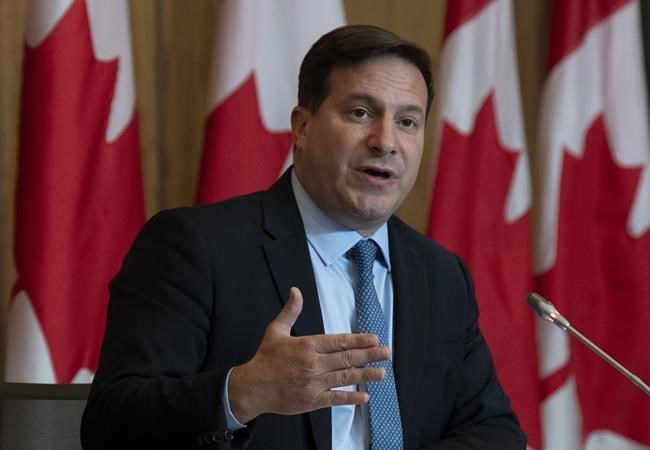OTTAWA — Public Safety Minister Marco Mendicino says he's concerned the RCMP chose not to the release the badge numbers of officers who cleared "Freedom Convoy" protesters from the Ambassador Bridge last winter.Â
The RCMP denied an access-to-information request for officers' names and badge numbers on the basis releasing the information could put officers' safety at risk.Â
The Canadian Press obtained a briefing note to Commissioner Brenda Lucki on the matter, which included an intelligence report showing that senior Mounties feared officers could be doxed by convoy supporters if they were identified. She was asked to approve the decision because it raised questions around transparency.Â
"I'm very concerned by that report," Mendicino said in a recent interview while visiting Saskatchewanto discuss policing on First Nations.Â
"Obviously, badges and names are there in the interest of transparency, and we'll have more to say about that."
Mendicino said the matter underlines the importance of government legislation tabled last spring, which he says would provide more robust civilian oversight of the RCMP.
Protesters decrying Prime Minister Justin Trudeau and his Liberal government's COVID-19 health mandates had blockaded the Ambassador Bridge connecting Canada and the U.S. between Windsor, Ont. and Detroit, Michigan for six days in February.Â
It reopened after police cleared demonstrators Feb. 13, laying more than 40 charges, the weekend before the federal government invoked the Emergencies Act.Â
In the note to Lucki dated last April, the RCMP flagged that leaders of the force in Ontario were among those to raise concerns about releasing the names and badge numbers of the officers involved.Â
"Given the current threat environment, this would pose a risk to the safety of personnel, but would be an example of the RCMP's commitment to transparency," it read.Â
"Mitigation measures to protect affected members and their families would need to be undertaken prior to the release."
Included in the briefing document to Lucki was an assessment RCMP prepared containing some comments it said were shared in a group for convoy participants on Telegram, an instant messaging app.Â
In one message, a user wrote: "These pigs deserve to die."Â
The force also said that some RCMP members reported receiving death threats, including against their families, after their names and cellphone numbers were leaked on social media. The personal information had initially been shared in an RCMP Musical Ride group chat.Â
The force appeared to recognize that withholding the badge numbers of officers could raise questions around transparency, and in the note to Lucki said the situation "presented an exceptional case" involving clear, credible threats.
The decision to deny the request for officer information would not reflect a change in policy under the access law, it said.Â
Experts say that, historically, it is not unusual to see police officers shield their badge numbers or names while responding to large-scale protests.Â
But University of Winnipeg criminology professor Kevin Walby says he sees the matter in question as presenting a "conundrum."Â
That's because existing laws and past court cases spell out that police must wear identifying information, he says, and access laws are designed to provide that transparency to the public.
This report by The Canadian Press was first published Oct. 18, 2022.Â
Stephanie Taylor, The Canadian Press




